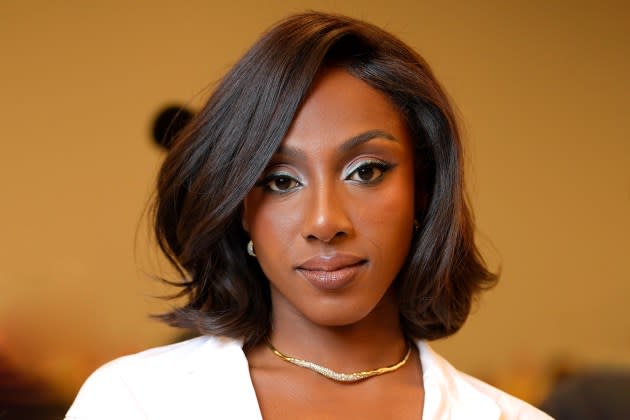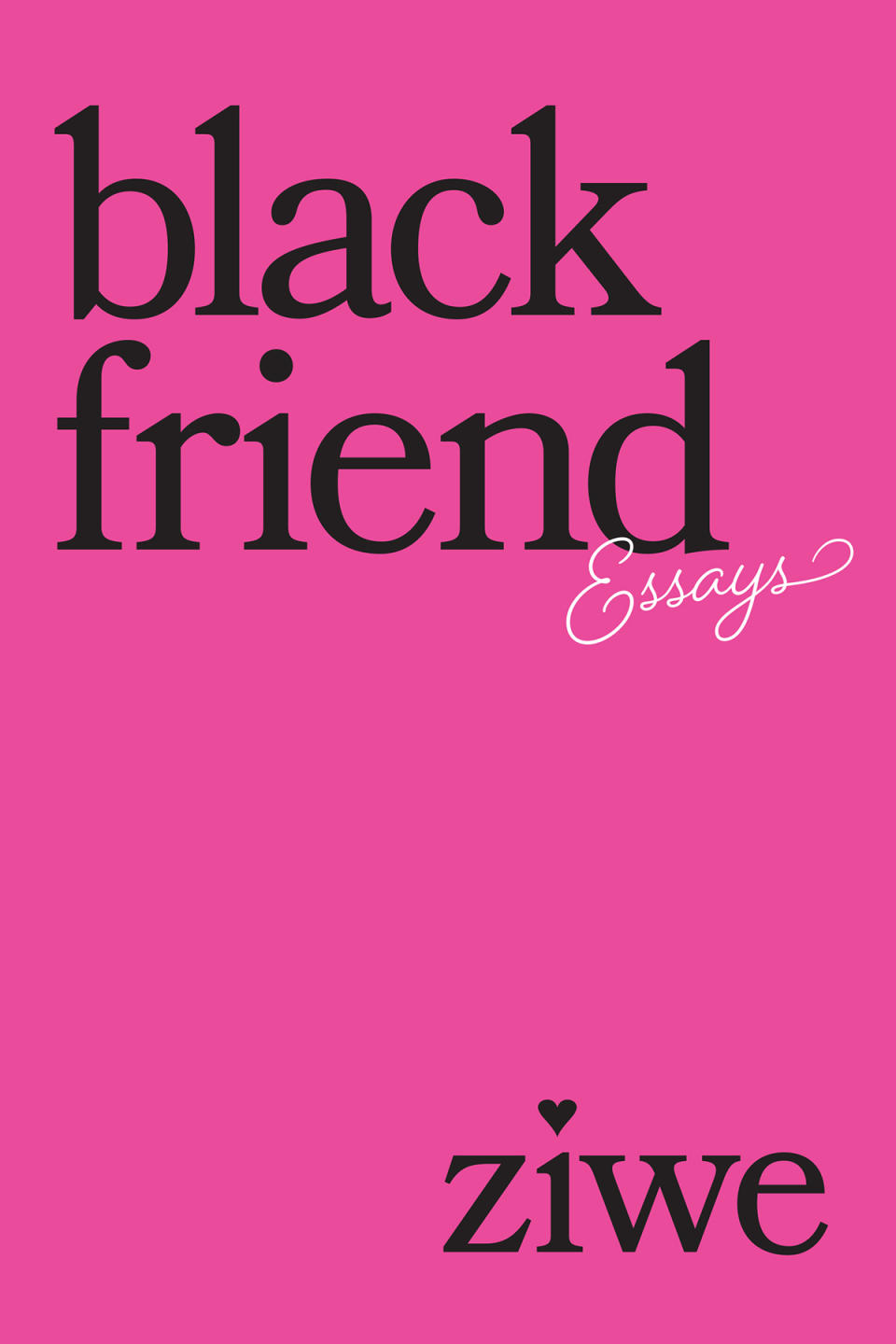How Ziwe Got Tender on Her Own Terms in Her First Book
- Oops!Something went wrong.Please try again later.
- Oops!Something went wrong.Please try again later.

Ziwe Fumudoh is not performing at BKLYN Clay, but glimpses of the eponymous character she took from buzzy Instagram Lives to a late-night premium cable show emerge as soon as she arrives. She’s direct, clear that she wants to immediately start our lesson at this hip New York ceramic studio.
“Let’s get this party started,” she quietly urges twice.
More from Rolling Stone
His True-Crime Podcast Stood Up for Victims. Now, He's Accused of Abuse
Thurston Moore Cancels U.S. Book Tour Due to 'Debilitating' Health Condition
Making pottery was Ziwe’s idea — she tells me she’s done it several times before — but I’ve never tried. We’re stationed across from one another, a table of supplies between us. She seems disinterested in the lesson being given by our instructor, Bernadette, who sits at a nearby wheel. It’s difficult for me to maneuver the clay, keep it wet, and stay sturdy on the speedily spinning pottery wheel, while also doing the interview.
“So, are we supposed to talk?” she asks me.
“We are, however … Ouch,” I say as I get nicked by the setup.
In the studio, she is as well dressed as she was on her Showtime series Ziwe, where she’d satirically grill celebrity guests (Drew Barrymore, Michael Che, Phoebe Bridgers, etc.) on topics like the Emancipation Proclamation and women in sports. As the show’s star and executive producer, she’d also put on musical spoofs and sketches that skewer culture and politics, all while in killer fits. Today, she has on the geometric black bustier and sleek matching skirt she wore earlier today on Bravo’s Watch What Happens Live to promote her first book. It’s a nonfiction essay collection called Black Friend, and when it was announced three years ago, it was billed to be a “subversive take on an anti-racist guide.”
“I just set out to write a funny book that had some really interesting pop-cultural opinions,” she tells me. “And then I ended up writing this super intimate essay book about different pop culture moments and how they define my life.” Black Friend is still very funny, but surprisingly tender, with stories of growing up in Lawrence, Massachusetts, “bitter and resentful of being a girl” because of gender norms, to attending a predominantly white screening of If Beale Street Could Talk where members of the NAACP were invited but relegated to stand-by seats.

The line between Ziwe, the eccentric agitator on our screens, and Ziwe, the 31-year-old comedian who finds solace in the woods and dotes over her year-and-a-half old chow chow, is a little blurry. When we talk, she adds high-femme drama to her descriptions of thrifting as a tomboy teen who still loved fashion (“You go to the thrift shop and you’re like, ‘Wow, look at this iconic look I just pulled off. Destined”) and America’s Next Top Model (“It was wildly traumatic and I loved every minute of it”). Yet there’s something much looser about how she approaches throwing clay and even her career path.
“I don’t really need plates,” she says. “Just kind of doing it for fun, because it feels good.”
When I stand up from my stool to watch Bernadette demonstrate wheel throwing more closely and probe her on technique, Ziwe asks me for my astrological sign. I tell her I’m a Sagittarius. She does not seem surprised. “There are some people who are like, ‘I want an apple,’” she says. “Some people are like, ‘I want to know where the apple grows. What color the apple is. What temperature the apple was.’ I just respect that thoroughness.”
She tells me she’s a Pisces. If Sagittariuses are thoughtful, I ask, then, what would a Pisces’ approach to the task be?
“Impatient, probably.”
“Like, ‘I’m trying to get the apple by any means?’”
“Yeah,” she says, “even if it’s a pear.”
Our conversation shifts to spirituality. She writes in her book that her mom, a Nigerian immigrant, “believes that my work is secular,” and that “we do not discuss much aside from food and God.” For Ziwe, though, spirituality is about connection. “I feel a spiritual connection with the clay, we’re making right now, as we would form it,” she says. “I feel like I’m a part of it. It’s like an extension of me.” When Ziwe is satisfied with her small lopsided dish, we move to a worktable between a shelf of ceramics to be fired and glazed and another shelf of finished products.
She sees her work as a comedian as grounded in connection as well. Ziwe, the character, she says, is influenced by Oprah, along with comics who employed faux journalism and mockumentary before her, like Nathan Fielder and Zach Galifanakis. Stephen Colbert, though, is a foundational reference of hers. “I remember watching him in high school. I remember his [White House] Correspondents’ Dinner where he jokes about s-ing someone in the face,” she says, recalling Colbert’s 2006 roasting of Vice President Dick Cheney accidentally and nonfatally shooting an acquaintance while hunting. “It was so unbelievable that he’d speak to authority or even around authority like that,” she says of Colbert. “I was really compelled by his satire.”
Ziwe went on to be a writing intern on Comedy Central’s The Colbert Report as well as The Daily Show while she was an undergrad at Northwestern University. I had seen her name floated by fans on Twitter as a candidate to replace Trevor Noah on The Daily Show now, so I ask if she’d want the role. She’s apprehensive about discussing the show as a striking SAG-AFTRA member (as a talk show, The Daily Show is in the clear and announced its return in September), so she hedges with a smile. “I don’t let any format limit my expression. I think that that’s why I have succeeded,” she says. “I have a very clear POV that would be absolutely — it would catch fire. So whatever format that exists next, I’m excited. Right now, it’s a book.”
It’s also a stand-up tour, which launches next week and is mostly sold out. She’s working on music bits for it, too, having released a comedic EP, Generation Ziwe, in 2021. Ziwe’s fascinating career is at a pivot point, though she’s more circling back than completely changing directions. She’s never been beholden to one thing.
Ziwe was canceled in April among other shakeups at Showtime under a new executive and network rebrand. Black Friend is her debut book, but before she was writing for shows like Desus & Mero and her own, she wrote for Reductress, Vulture, and The Onion. The prototype for Ziwe was a web series called Baited she launched in 2017 for a YouTube comedy channel founded through Saturday Night Live creator Lorne Michaels’ media company. Comedian and The Daily Show correspondent Roy Wood Jr. recently praised Ziwe’s success in carving out her own career path. “A lot of what became Ziwe’s show was because she built an audience for herself and then Showtime came,” he told Rolling Stone.
Her pointed way of probing issues of identity and social hierarchy caught fire in 2020, as both the pandemic and racial justice movements around the murder of George Floyd and killing of Breonna Taylor hit a fever pitch. From her Instagram account, she interrogated people who had been condemned for perceived acts of racism or discrimination. Ziwe made folks like Caroline Calloway, Rose McGowan, and Jeremy O. Harris squirm in jest by asking pointed questions there are no good answers to. As she quizzed them on Black historical figures, a piece of the real her was revealed, as it does throughout Black Friend: Ziwe is a huge history nerd, with an undergraduate degree in African American studies, as well radio/television/film and poetry. But that wasn’t necessarily about becoming a force in socio-political satire.
“I incorporate history into my work because we are a part of history, and we stand on the shoulders of those before us,” she says. “It’s not a calculation. It’s really like, these are my interests, how can I express my interests?”
When I was introduced to Ziwe’s Instagram interviews in 2020, it was by white people who didn’t just find it funny, but important — it felt like her work was being taken so seriously. “I cannot control how my work is interpreted,” she says when I note this. “That’s something that you give up and you have to be at peace with that. There are people who interpret me as really serious.”
Even as Ziwe’s comedic chops were praised, she was also sometimes considered “revolutionary” in the face of racism. “We know what Ziwe wants to dismantle. But what does this self-described ‘agent of chaos’ want to create?” Critic Doreen St. Félix wrote in 2021 in The New Yorker, calling Ziwe “a maven of self-promotion, [who] claims that she sees her form of caustic satire as the conduit to a confrontational education.”
Today, Ziwe’s driving force is more connection and catharsis. “If watching my show brings the world peace, that would give me so much joy,” she says with what sounds like genuine earnestness and sarcasm at once. “If reading Black Friend on Oct. 17 would cure the world of all of its problems, I would be like, Yeah, I did that. Slay.”
“But that’s not the thing that you’re setting out to do, right?” I ask.
“I mean, what does one set out to do when they write?” she responds. “You want to communicate your feelings in a way that is effective and clear. And so my goal is to make people laugh. And anything else that happens other than laughter, I’m like, yeah.”
Ziwe is at her most rigid when she seems to think she’s being misunderstood, like she needs to steer her narrative back under her control. When she tells me that all the elements of her life are poured into her work, particularly her emotions, I respond that that makes the work, even her character work, kind of diaristic. She refutes this with a firm, “No.” After a beat, she adds, “There’s an emotional truth, and there can be really interesting creative things that come from just where you were in a moment when you thought everything was so serious and when you look back it was not.”
As we wrap, I ask her about a line in Black Friend I found particularly poignant: “I would not be here if I didn’t fail — boldly, spectacularly, with frequency.” I’ve been moved by those words as I made mistakes that felt like failures, and tell her as much.
“What do you feel like you failed at?” I ask, since I’m not sure she ever discloses that in the book. She seems so in control of her career so far — even Ziwe getting canceled doesn’t strike me as a failure, especially in such a volatile industry.
“You want me to list my failures? That seems like a trap,” she says. And she doesn’t budge. She says listing her failures would be “triggering,” though in the book she framed them with such value. I asked out of relational curiosity — only one of us has hosted a show called Baited here. But clearly it’s different if you’re the one asking the questions. It’s in her book, where she’s the one in control, that she’s the most open. “Failure has not killed me,” she writes in Black Friend. “Yet I am afraid of the vulnerability that comes with centering myself in my own stories.”
Best of Rolling Stone

